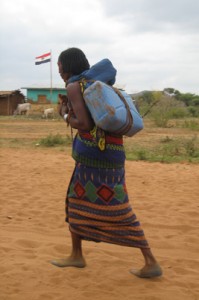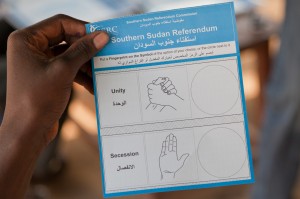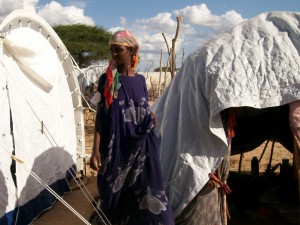Sisters and brothers in Christ,
I’ve been working in Minot, North Dakota this week. Historic flooding brought the Souris River here over its banks, defeating levee attempts and devastating Minot and other communities like Burlington. Over 5,000 homes and hundreds of businesses are flooded in these communities. This flood has been very slow to recede, with water still over the first floors of many structures, and as such, hundreds of homes and businesses will probably need to be condemned and torn down. A boil order remains in effect for the Minot water system for the foreseeable future.
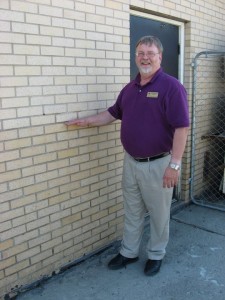
Pastor David Maxfield (Christ Lutheran, Minot, N.D.) shows the high water mark on the outside of the church. Officials have not yet given them clearance to enter the building for further inspection.
This flood has acutely impacted the Lutheran community. Lutherans are the majority religious group in this part of the country. Four ELCA churches have sustained flood damage. First Lutheran in Minot and Peace Lutheran in Burlington have extensive damage in their basements, with yet unassessed damage from humidity on the main floors. Augustana Lutheran and Christ Lutheran in Minot had significant amounts of water in the sanctuary of the buildings. We were not yet able to enter these churches to assess the extent of the damage, but it will certainly be heart breaking.
I’ve spent a lot of time this week with Bishop Mark Narum of the Western North Dakota Synod. Bishop Narum has been in Minot nearly every day of this crisis, ministering to the affected communities and supporting the clergy here. Bishop Narum estimates that the combined damage to ELCA churches in this area will be well over $1 million. With hundreds of members’ homes flooded, along with the churches, rebuilding will be a long and difficult journey.
Bishop Narum gathered many of the pastors and other leaders at Bethany Lutheran Church on Wednesday morning for fellowship and mutual support. At least 10 ELCA pastors’ homes are flooded, along with the rest of their community. We spoke as a group about the long-term plans to coordinate volunteers and restore homes, churches and lives. No one here doubts that this will all come to pass, but for now, there is deep pain.
We need to rest for this moment in the experience of all that has been lost. I met Gary Johnson, the council president of Augustana Lutheran. Mr. Johnson shared with me that his grandfather was a founding member of Augustana. Gary’s three children and a grandchild were all baptized at Augustana. Generations of worship and prayer hallow a place like Augustana, and it is deeply painful knowing that it sits, for now, cut off and surrounded in a watery place.
I fellowshipped with Pastor John Streccius and Pastor Nathan Mugaas, both of Zion Lutheran Church in Minot. It was a reunion of sorts, as years ago, during my first call after seminary, I used to attend sermon text study at a church in Hoople, North Dakota where Pastor Streccius was serving at the time. Both Pastors Streccius and Mugaas have flooded homes at this time, and they and their families are staying at members’ homes. John and Nathan are sustaining pastoral ministry among the people of Zion Lutheran Church, with about a hundred members with flooded homes, even as they also deal with their own losses.
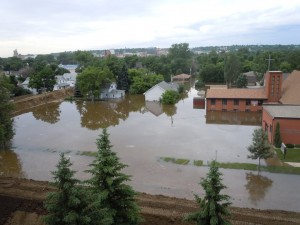
Augustana Lutheran Church (Minot, N.D.), as seen from a nearby property, completely surrounded by flood waters.
In the midst of so much ambiguity and loss, signs of hope and progress are emerging. Local planning of volunteer efforts here is underway with Lutheran Social Services and other local organizations. Training for homeowners is being offered this week on how to safely enter and clean up a flood-affected property. Yesterday, Mayor Zimbelman informed us that he wants Lutheran Disaster Response to oversee the volunteer efforts for clean-up in Minot, and he announced the same publicly in a press conference later in the day. It’s a daunting task, but many organizations together will cooperate to serve here.
I was very appreciative this week for Sherie Heine and her mother, Pat. Sherie is vice president of the Western North Dakota synod council. The Heines hosted me at their home in Minot, since every motel room in town is currently occupied by evacuees from the flood zone. Sherie is leading an important initiative for the synod to raise funds to assist the flooded churches.
Please pray with me for the people and pastors of Minot and Burlington impacted by these terrible losses, and for the many others in North Dakota and elsewhere affected by floods this spring and summer. They will need the whole church to help them recover. They will need sustained prayer. They will need volunteers, when the time is right, to help clean up and rebuild. And they will need financial support to help restore the damaged congregations, as they plan and hope for a new future of ministry here in the Souris River Valley.
In service,
Rev. Kevin A. Massey
Program Director
